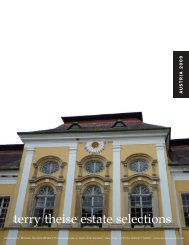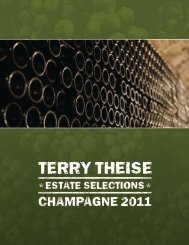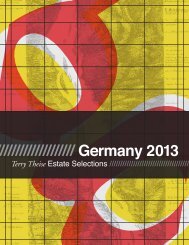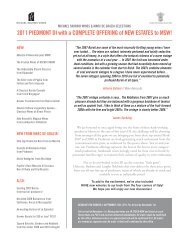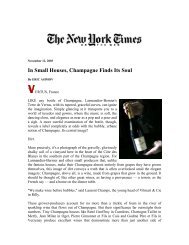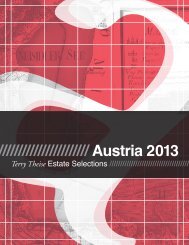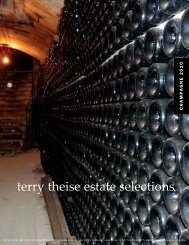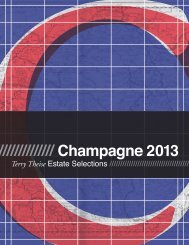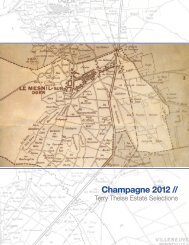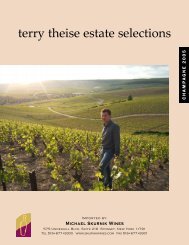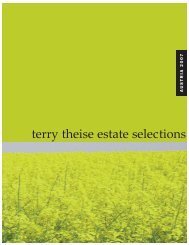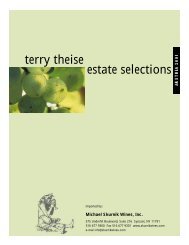German Catalog 2006 USE THIS ONE.qxp - Michael Skurnik Wines
German Catalog 2006 USE THIS ONE.qxp - Michael Skurnik Wines
German Catalog 2006 USE THIS ONE.qxp - Michael Skurnik Wines
Create successful ePaper yourself
Turn your PDF publications into a flip-book with our unique Google optimized e-Paper software.
It’s best if I don’t think about the wines until they’re<br />
in the glass. I try to subdue any pleasure of anticipation.<br />
I just want the wines to come to me. I want the awe to<br />
live in them, and come to me; I don’t want to bring it. I<br />
tasted the wines twice one year, about two weeks apart,<br />
as I made a second visit with Kevin Pike. The latter runthrough<br />
was a brisk affair—we hadn’t much time—and<br />
it lubricated a somewhat delicate conversation which<br />
engaged most of my attention. I found it fascinating to<br />
scroll through these wines, which I love like none other,<br />
with only a sideways glance. In one particular moment I<br />
was groping to say something subtle in my inadequate<br />
<strong>German</strong>, concentrating entirely on finding words I didn’t<br />
know, and suddenly the wine in my glass found a seam<br />
and soaked through it, and I realized I was near tears. It<br />
was shockingly beautiful. I was closed to the world, and<br />
the world opened me. And what of this? it seemed to say.<br />
I like to hike in high mountains, it is huge and stirring,<br />
but this was different, this was anything but overwhelming.<br />
This was quiet, it was the underside of a leaf,<br />
it was hoar frost on a branch, the kind eye of an old dog,<br />
a small thing standing simply in my sight as if by accident,<br />
and I was alight with it. And what of this? And I<br />
wondered, what of it? Yes it is beautiful, but what of it?<br />
It is always here.<br />
My wife is someone who likes to remember her<br />
dreams and consider their meaning. I find this lovely, but<br />
do not share it. It seems ordinary enough that our subconscious<br />
hums and buzzes all the time, and that we only<br />
see it when our waking consciousness gets out of the way,<br />
just as we only see stars in a dark sky. I thought of this<br />
suddenly. It is always here. Yes, just as the stars are always<br />
there, even when we can’t see them. Just as the dreams<br />
are always there even when we don’t dream them.<br />
This is a long way to venture out from a single sip of<br />
wine. But any single sip of wine can show us the whole<br />
world, can show us the reality we usually ignore, the<br />
thing that is always there, and which we see through<br />
angel-eyes. Wine can remind us to pause, notice and<br />
appreciate. It is always here. Beauty is always here. This<br />
strange, sad, beautiful world is always here in all its<br />
gravity and gorgeousness, ready to unfold us. Colin<br />
Wilson once said “What if we aren’t risen apes, but<br />
instead fallen angels?”<br />
Think about when you make up after a quarrel.<br />
Think of the moment you realize I love her, she is beautiful,<br />
why are we fighting? You are suddenly inside the<br />
deeper truth, the one which abides below all your politics<br />
and power struggles, the truth that is always there.<br />
Sometimes a great wine will deliver all of wine—all of<br />
beauty—to you, and for a moment you are inside the<br />
slower, deeper truth, and you know that all your fussing,<br />
over adjectives and associations and quantification of<br />
your pleasure and dissecting of flavor is all a bagatelle, a<br />
waste of time. A waste of wine.<br />
I envision Helmut reading these words and thinking<br />
“Hey, don’t hold me responsible for this!” I imagine any<br />
instruction he might wish to impart would boil down to<br />
not losing the forest for the trees. Which is true enough,<br />
yet on we go.<br />
From the top of the Lemberg you look out not merely<br />
on vineyards, hills, rivers; you don’t even look out on<br />
“scenery.” You look out on landscape, that thing which is<br />
larger than scenery or the parts of scenery. Just as the<br />
idea of “forest” is different in essence from the fact of<br />
trees. And when you see landscape you are quite sure it<br />
means something, though you can’t say just what. Great<br />
wines arise from landscape as much as from vineyards.<br />
Great wines arise as much from civilization as they do<br />
from people or cultures.<br />
And so we might define great wine as wine which is<br />
incandescent<br />
with reality, that<br />
is somehow larger<br />
and more eternal<br />
than its mere<br />
ostensible self,<br />
and which<br />
speaks to that<br />
thing in each of<br />
us. But don’t go<br />
looking for it. Be<br />
calm and prepared,<br />
and it will<br />
find you.<br />
My favorite<br />
of all those aching drawings of Käthe Kollwitz is called<br />
“Prisoners Listening To Music.” In it the damned, the<br />
wretched, are looking wonderingly at a cloister inside<br />
themselves they didn’t know was there. The experience of<br />
beauty reminds us we are at least partly angels. We must<br />
be, if, when they visit us, we understand them. Dönnhoff’s<br />
wines are quiet and searching, and you hear them from an<br />
interior world monastic and still.<br />
Helmut Dönnhoff knows his wines are good. He<br />
doesn’t strut about it but he isn’t aw-shucks either. I once<br />
asked him if he agreed his goal was to make wines of<br />
crystaline texture and precise articulation. “I don’t disagree,”<br />
he replied. Then how do you get there? I had to<br />
know. There is, in effect, no “how,” was his answer. Wine<br />
results from the confluence of a multitude of small choices,<br />
which alter as circumstances mandate. There’s no<br />
recipe. There is ever-more reliance on instinct. Dönnhoff<br />
is very respectful of spontaneous instinctive recognition,<br />
and has become wary of the intellect’s appetite to deconstruct.<br />
One year he spoke with David Schildknecht and<br />
said this telling thing:<br />
“I am always asking people who have no technical<br />
expertise to assess the taste of my wines. The postman,<br />
for instance. I ask him, ‘Would you just please taste these<br />
three wines and tell me which you prefer.’ ‘Oh, it’s really<br />
too early in the morning . . .’ he protests, but I pull him<br />
in and sit him down anyway. And then he says something<br />
quite amazing and insightful that suddenly opens<br />
your eyes to the wine. And here is the decisive point:<br />
there are a lot of us who know too much about wine to be<br />
able to taste.”<br />
Precisely.<br />
Dönnhoff sees his work as craft; such art as may<br />
exist in wine comes from nature. “All the real work of the<br />
99<br />
NAHE WINES



